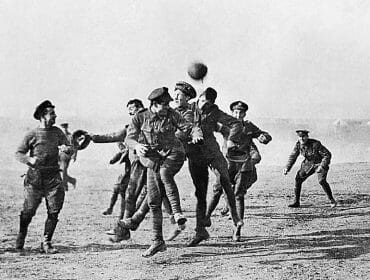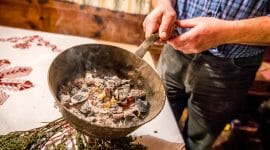Verses about peace, hope and solace
“Holy infant, so tender and mild, sleep in heavenly peace”: Joseph Mohr’s Christmas poem begins as a lullaby to the newly born Baby Jesus. The young priest, who is said to have cared deeply for ordinary people, was aware of the anxieties and the suffering his countrymen were experiencing. Hence, he wrote the poem in German and in such a way that it was easy to understand and would move people deeply. The comforting idea of being saved from suffering through the birth of Jesus Christ and by way of God’s love for the peoples of the world continues all the way to the sixth stanza and gave people strength and confidence, in part also due to its moving melody.
“Silent Night” in the trenches
Christmas 1914: Around five months after the beginning World War I, something occurred on the Western Front — where over a million soldiers had already died or been wounded — that would become known as an unlikely pacifist and fraternal miracle between thousands of soldiers of different nations. On 24 December, Christmas Eve, the trenches went quiet. Several soldiers placed small, illuminated Christmas trees on the upper edge of their trench — as a sign of peace. On both sides of the approximately 50-kilometre-long front in Flanders, the combatants collectively put down their rifles and helmets and sang their domestic Christmas songs. “Silent Night” was also heard — and sung in various mother tongues. The peaceful, solidary Christmas celebration in the middle of the war was treated as a state of emergency. Fraternisation was subsequently prohibited and made punishable by death.
Leopold Kohr and the Christmas song as a political message
During the Second World War and through the middle of the 1950s, the emigrant from Oberndorf Leopold Kohr (1909-1994) fused a message of peace with political statements against the war. In the United States, the economist and philosopher from Salzburg published highly successful calls for empathy for his Austrian homeland with the help of “Silent Night”. Every year during the Christmas season, he wrote dozens of newspaper articles, employing “Silent Night” as a political song against Nazi Germany and calling for the liberation of Austria. With sentimental descriptions of his home of Salzburg and the Austrian Alps, he managed to capture the emotions of his readers: “Oberndorf is only a small village in Austria. But it is my village, and this is why I often like to think of it. In the distance rise the mighty chains of the Alps to their majestic height. And the melody will float out again from the village which created it to the world to which it belongs.”
“Silent Night” resounds in the garden of the White House in 1941
Leopold Kohr made the leap into the political world with an experience that he had during Christmas of 1914, when he witnessed Franklin D. Roosevelt and Winston Churchill singing “Silent Night” together with crowds of people in the garden of the White House. “Maybe it was only I who had tears in my eyes. But I thought, sometime, when freedom and peace reign over the world again, and Austria is independent anew, I will tell them at home about the President and the Prime Minister singing Silent Night.”
Following the end of the war, Kohr moved his political writings aside and placed emotion at the centre of his Christmas messages. Filled with joy, he spoke about the light in children’s eyes and the return of the picturesque landscape of the Austrian Alps he used to call home.
“Silent Night” and “The Sound of Music”
The story of the Trapp family from Salzburg, which had also emigrated to the United States prior to the outbreak of the Second World War and which was perhaps Austria’s most famous band, took a similar turn. In January of 1947, Major General Harry J. Collins approached the Trapp family in the USA. The officer had come to Salzburg with his famous 42nd Rainbow Division and outlined the suffering that the Austrians were experiencing after the War. The Trapp family reacted spontaneously and formed the Trapp Family Austrian Relief Inc. as an official group to support Austria and based it in Stowe, Vermont. Georg von Trapp was registered as the founder and first president, Maria von Trapp as president, Franz Wasner as treasurer. 150 tonnes of relief goods came together once the Trapp family opened their concerts with the following appeal: “The country, that gave the world Haydn, Mozart, Schubert and Silent Night will perish if we don’t all work together and help.”



